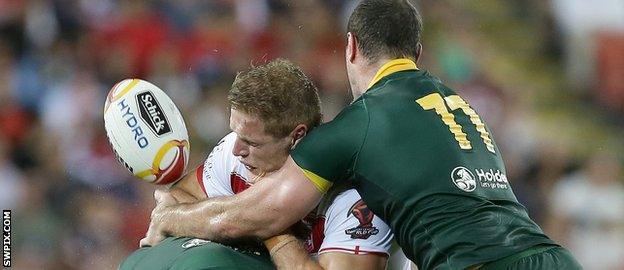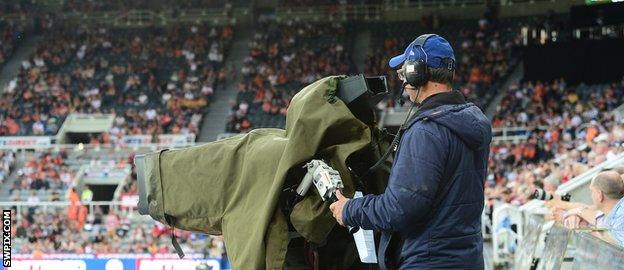Super League 2020: 'Two years that will shape rugby league'
- Published
Joining Toronto and switching codes - Sonny Bill Williams talks to Mark Chapman
Betfred Super League |
|---|
Dates: 30 January-10 October Coverage: Listen to live commentary across BBC Radio 5 live, BBC Radio 5 live sports extra and BBC local radio, watch highlights on the Super League show, live text commentary on selected games and reports on the BBC Sport website and app |
This is not just the start of a new season - we're at the beginning of a two-year period that will define the whole future of rugby league.
There are television deals to be negotiated, a World Cup to be staged, possible private equity investment to be considered and expansion to be handled.
If all those hurdles and opportunities are met well, then rugby league has a bright future. If not, the professional game slips deeper into the backwaters of the British sporting psyche and may never recover.
What happens in the next two years, starting now, could have as big an historical impact on the sport as the original split from rugby union back in 1895.
But there are reasons to be optimistic.
The fact that the World Cup comes at the end of this two-year cycle is a tad unfortunate. Because in the autumn of 2021 the game will achieve its highest profile in a lifetime.
What can the World Cup do for rugby league?

England will take on Australia in a Test series in 2020, and then there is a home World Cup the following year
Three World Cups - the men's, women's and wheelchair tournaments - will all be staged under the same banner, with a significant cluster of high-profile matches on prime-time terrestrial TV.
The inclusion of some deliciously unfamiliar rugby league nations in those tournaments, like Jamaica, Greece, Brazil, Norway and the USA, adds extra potency for the publicists.
And the organisers are confident of filling some wonderful stadiums, St James' Park, Old Trafford, Anfield and the Emirates Stadium amongst them.
For even the most rugby league-averse, it will be hard to ignore the sport in that condensed five-week period.
Somehow, the momentum and potential feelgood around the sport that should be generated in October and November 2021 needs to be pre-loaded into the TV contract talks that will be beginning soon, because any new deal will kick in immediately after that World Cup.
Whoever is televising rugby league in 2022 and beyond, may well be doing so at a time when the sport is enjoying its broadest appeal and cut-through since the inception of Super League and the switch to 'summer' in 1996.
Finding a broadcaster keen to televise rugby league is one thing, finding one keen to pay a similar amount to the current deal is quite another. And there's a big problem.

Rugby league clubs have been extremely reliant on television revenue for their existence
The business model for just about every Super League club, ever since Rupert Murdoch dropped his millions into the English game in the mid-1990s, has been based on that TV income.
Telly is paying the wages.
Without it, the game, in its current state, goes bust and will have to revert back to being a mainly part-time sport. Some players would have full-time contracts, the majority wouldn't. Talent drain to the NRL and rugby union would be inevitable.
So if a new TV contract that matches the current deal can't be found, then rugby league has to look for a plan B, a different way of funding itself, in order to thrive and prosper.
New revenues, new directions?
And that's where the prospect of private equity investment becomes attractive - but there are drawbacks.
The first is that there has to be interest in the game from that source. If private capital doesn't think there's a profit to be made from the sport, then it won't invest.
Clear that hurdle, and get the investment, and you're then handing over a proportion of control to the money men and women. They will set the strategic direction for the sport to take, watering down the influence of the RFL, of Super League and the individual clubs. And their motivation will be profit.
That might be a situation rugby league has to take on the chin. It's probably the only way it can achieve the status it desires. But there will be some big decisions taken in that process, bigger even than the potential mergers that were mused over in the mid-1990s.

Toronto Wolfpack have brought new audiences to rugby league, but they are not universally well-received
The most likely scenario, if private equity is successfully invited in to rescue the professional game, would be a closed shop of Super League clubs, chosen for their strategic value rather than any heritage.
Think two clubs in France, a London side, Toronto and a second North America club and then pick seven of the current heartland clubs who would be fit for that new era.
There are several owners of current Super League clubs who would be part of the process of bringing in private equity, and who would know full well that their clubs would have no Super League future, or who would be at best on borrowed time, once that money started to flow.
Within the next 12 months we should know whether that's a road the game decides to go down.
Building expansion, broadening horizons, global markets
The arrival of Toronto into the Super League, with Sonny Bill Williams centre stage, has created a real curiosity that has been lacking in recent years.
A Canadian side and a French side in the top flight of an otherwise English league is genuinely jaw-dropping for the majority of non-RL fans that I come across. The game can no longer be passed off as that strange pastime that takes place in odd northern towns.
Incredibly there is, in some quarters, a feeling of resentment towards Toronto. A misplaced sense that somehow the game is wasting money on their presence. Fans of some clubs fear their team could be pushed away from the table because of the newcomers.
The Wolfpack are self-funded. And the sport should be hugely reassured that a businessman like David Argyle would be willing to plough millions of his own dollars into rugby league, propelling the club through the divisions and into the big time, bringing with them a few thousand new Canadian converts and driving up media attention to almost unprecedented levels.
Thankfully, the kick-off to a new season means we can, for a while, put the politics (well, barring the salary cap and the arrival of Israel Folau - that's another story) to one side and focus on what we love the most - the game itself.
Super League Grand Final highlights: St Helens 23-6 Salford Red Devils
The 25th edition of Super League has the real potential to be a golden year.
Ignoring Sonny Bill, and that's hard to do, there are plenty of other genuinely stellar imports into the competition this year. And a switching of teams by other star names makes for some intriguing scenarios all around the top flight.
If the rest of the league can reel in St Helens, then the race for the top five could be genuinely compelling. Sadly, with no obvious relegation candidate at this point, the battle to avoid being dumped out of Super League looks set to be as nerve-tingling as last year, and hugely damaging for whoever does go down.
The game needs to find a way to stop relegation being such a potentially cataclysmic event, but at the same time find a way to keep the dream alive for those on the rise in the Championship and League One. The fact that it hasn't yet solved that problem is an indication of how difficult it is to square the circle.
On a personal note, I've not looked forward to a season as much in years.
Prince Harry and Sonny Bill have, in their own unique ways, given the 13-man code of rugby a wonderful, positive profile over the last few weeks.
Now its up to the players - amid the off-field concerns - to pick up the baton and entertain us as we settle in to the start of this momentous next two years.
